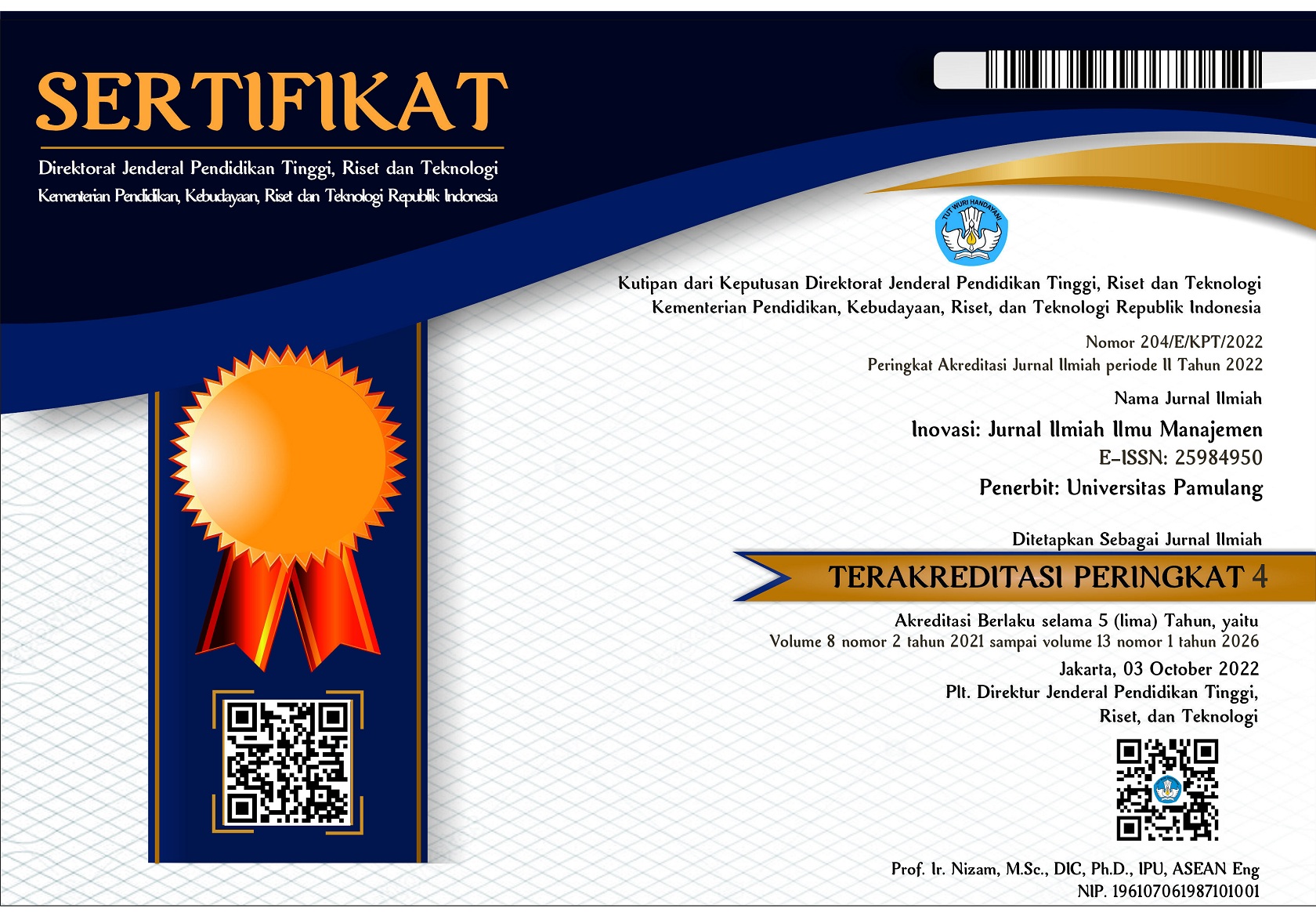SERVANT LEADERSHIP IN NON-PROFIT ORGANIZATION
DOI:
https://doi.org/10.32493/Inovasi.v9i2.p46-51.26376Abstract
The organization is a place for several people or groups of people who carry out activities in achieving goals. In achieving its goals, the organization consists of organizations that have profit and non-profit goals. The development of both profit and non-profit organizations requires a leader with leadership skills. This study analyzes Servant Leadership in non-profit organizations. The method used is qualitative with a case study in a non-profit organization in the South Tangerang area. The study involved four informants with focus group discussions. Each informant gave a statement on the questions posed. The results of this focus group discussion obtained 5 categories of servant leadership in non-profit organizations. The five categories of servant leadership are (1) delegation, (2) integrity, (3) motivation, (4) human resource development, and (5) open communication.
Keywords: Servant Leadership, Leadership, Non-Profit Organization
References
Gani, N.A., Utama, R.E., Jaharuddin, & Priharta, A. (2020). Perilaku Organisasi. Jakarta: Penerbit Mirqat.
Anco, A., Apipudin, A., & Arifin, M. (2021). The Effect of Leadership And Conflict on Performance of Education Services of Buton District. International Journal of Social Service and Research, 1(4), 341-348.
Ardani, D. S. (2017). Influence of organizational culture, team conductivity, personality, and trust to the outlet leading organization commitment. IJHCM (International Journal of Human Capital Management), 1(02), 10-18.
Kadar, M. G., Sari, O. H., Simarmata, H. M. P., Lie, D., Sugiarto, M., Tanjung, R., ... & Weya, I. (2021). Manajemen Strategik dan Kepemimpinan. Yayasan Kita Menulis.
Ololube, N. P., Agbor, C. N., & Agabi, C. O. (2017). Effective leadership and management in universities through quality management models. In Innovation and shifting perspectives in management education (pp. 224-245). IGI Global.
Lee, M. R. (2021). Leading virtual project teams: Adapting leadership theories and communications techniques to 21st century organizations. Auerbach Publications.
Northouse, P. G. (2021). Leadership: Theory and practice. Sage publications.
Ellis, P. (2021). Leadership, management and team working in nursing. Sage.
Pahi, M. H., Ahmed, U., Sheikh, A. Z., Dakhan, S. A., Khuwaja, F. M., & Ramayah, T. (2020). Leadership and commitment to service quality in Pakistani hospitals: The contingent role of role clarity. SAGE Open, 10(4), 2158244020963642.
Afsar, B., Maqsoom, A., Shahjehan, A., Afridi, S. A., Nawaz, A., & Fazliani, H. (2020). Responsible leadership and employee's proenvironmental behavior: The role of organizational commitment, green shared vision, and internal environmental locus of control. Corporate Social Responsibility and Environmental Management, 27(1), 297-312.
Oliveira, M., Sousa, M., Silva, R., & Santos, T. (2021). Strategy and human resources management in non-profit organizations: Its interaction with open innovation. Journal of Open Innovation: Technology, Market, and Complexity, 7(1), 75.
Zhuravleva, A., & Aminoff, A. (2021). Emerging partnerships between non-profit organizations and companies in reverse supply chains: enabling valorization of post-use textile. International Journal of Physical Distribution & Logistics Management.
Rukin, S. P. (2019). Metodologi Penelitian Kualitatif. Yayasan Ahmar Cendekia Indonesia.
Tohardi, A. (2019). Pengantar Metodologi Penelitian Sosial+ Plus. Tanjungpura University Press.
Yanti, L. (2021). Analisis Kinerja Pegawai Berdasarkan Aspek Kepribadian Diri. AKADEMIK: Jurnal Mahasiswa Ekonomi & Bisnis, 1(1), 27-33.
Juliati, F. (2021). The Influence Of Organizational Culture, Work Ethos And Work Discipline On Employee Performance. AKADEMIK: Jurnal Mahasiswa Ekonomi & Bisnis, 1(1), 34-39.
Agustine, C. (2021). ANALISIS RASIO LIKUIDITAS, RASIO PROFITABILITAS, DAN RASIO SOLVABILITAS UNTUK MENILAI KINERJA KEUANGAN PERUSAHAAN PADA PT. SURYA TOTO INDONESIA TBK PERIODE 2010-2018. AKADEMIK: Jurnal Mahasiswa Ekonomi & Bisnis, 1(2), 68-76.
Baeli, J. (2021). Analysis Of Tax Compliance Based On Psychological Factors And Tax Administration. AKADEMIK: Jurnal Mahasiswa Ekonomi & Bisnis, 1(3), 87-94.
Majid, I. K. (2021). Governance-Based Library Management, More Effective and Efficient. AKADEMIK: Jurnal Mahasiswa Humanis, 1(2), 68-76.
Karim, I. N. (2021). CORRELATION ANALYSIS: Are Religious Scavengers More Motivated?. AKADEMIK: Jurnal Mahasiswa Humanis, 1(2), 59-67.
Ulfah, M. (2021). Building Teacher Performance Based Islam Religious Values. AKADEMIK: Jurnal Mahasiswa Humanis, 1(1), 9-17.
Mukminat, S. S. (2021). Realitas Kinerja Dosen, Apa Dampaknya?. AKADEMIK: Jurnal Mahasiswa Humanis, 1(1), 1-8.
Iswardani, W. (2021). Hydroponic Vegetable Production Planning at Plantation Parung Farm Bogor. AKADEMIK: Jurnal Mahasiswa Sain & Teknologi, 1(1), 8-15.
Indra, W. (2021). Detection of Gen C/EBPα Encodes the Meat Quality. AKADEMIK: Jurnal Mahasiswa Sain & Teknologi, 1(1), 24-32.
Downloads
Published
How to Cite
Issue
Section
License
Authors who publish with this journal agree to the following terms:
- Authors retain copyright and grant the journal right of first publication with the work simultaneously licensed under a Creative Commons Attribution License that allows others to share the work with an acknowledgement of the work's authorship and initial publication in this journal.
- Authors are able to enter into separate, additional contractual arrangements for the non-exclusive distribution of the journal's published version of the work (e.g., post it to an institutional repository or publish it in a book), with an acknowledgement of its initial publication in this journal.
- Authors are permitted and encouraged to post their work online (e.g., in institutional repositories or on their website) prior to and during the submission process, as it can lead to productive exchanges, as well as earlier and greater citation of published work (See The Effect of Open Access).
INOVASI: journal of managenet have CC-BY-SA or an equivalent license as the optimal license for the publication, distribution, use, and reuse of scholarly work.
In developing strategy and setting priorities, INOVASI: JOURNAL OF MANAGEMENT recognize that free access is better than priced access, libre access is better than free access, and libre under CC-BY-SA or the equivalent is better than libre under more restrictive open licenses. We should achieve what we can when we can. We should not delay achieving free in order to achieve libre, and we should not stop with free when we can achieve libre.









